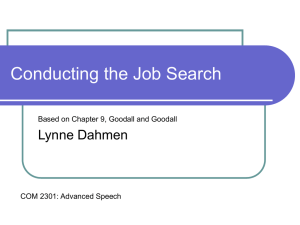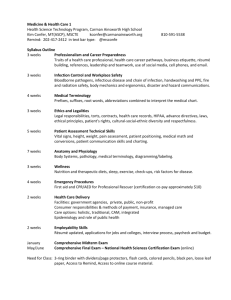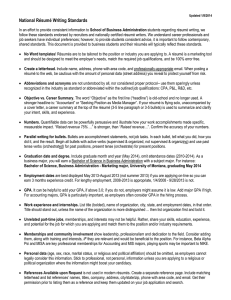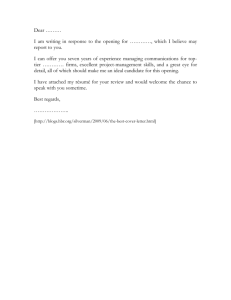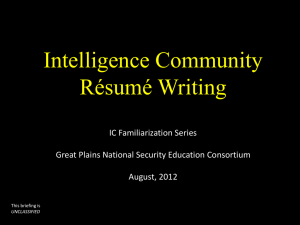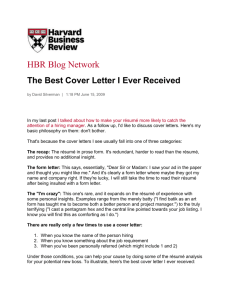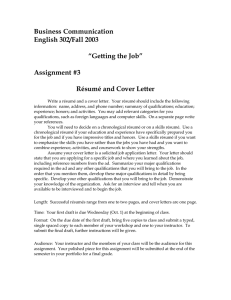Global Hiring Trends 2012
advertisement
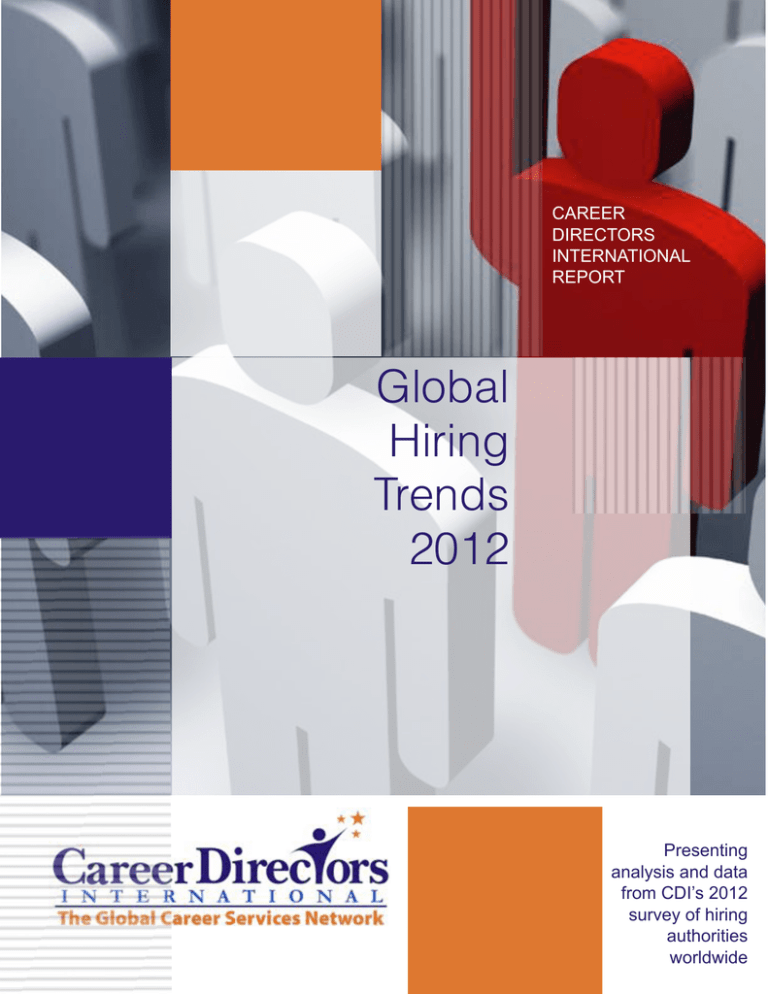
CAREER DIRECTORS INTERNATIONAL REPORT Global Hiring Trends 2012 Presenting analysis and data from CDI’s 2012 survey of hiring authorities worldwide About this survey and report What is Career Directors International? Career Directors International (CDI) is a professional association committed to delivering industry innovation and unlimited potential for career professionals. We place top priority on introducing member opportunities in education, connection and empowerment, and our global membership spans all career disciplines—from résumé writers, career coaches and counselors, to job developers, recruiters, outplacement specialists, HR practitioners, and other specialists. Why this survey? At CDI, we found we had become weary of rumors and folklore when it came to hiring trends. This was especially true as it related to the many ways that résumés ‘could be’ and ‘should be’ written. For example, something said to one job seeker by a recruiter, suddenly becomes a fact quoted by all! These 'facts' take on a life of their own and nobody knows where they started or why. In some cases, they make no logical sense to professionals, let alone to confused job seekers getting advice from all sides! So, this year, CDI decided to take action. Thanks to the Certification Committee and the reach of our global members, we have brought real and concrete data into the discussion by surveying those in the know—recruiters, human resource professionals, and other hiring authorities. This report, representing preferences from professionals worldwide, allows us all to gain a better sense of what is true and real when it comes to hiring trends and résumés. Why Global? As a career association with a diverse membership of nationally- and internationallybased career professionals, CDI wanted to identify and reflect the insights and preferences of our extended professional network. Therefore all hiring authorities worldwide were invited to participate in this survey. About this survey and report Why do we interpret the numbers? As anyone who has ever read a survey knows, numbers rarely tell the full story. The aim of this survey is not to regurgitate isolated percentages and figures, but rather to give meaningful insights into the experiences and preferences of hiring authorities during the selection process. We have taken steps to bring context and relevance to the data by providing an interpretation of each graph that highlights potential summations for consideration and further discussion. CDI acknowledges that these are simply interpretations, and we have made available the graphs and data so that individuals may draw their own conclusions. We hope by employing this method, we can shed some light on the meaning behind the statistics, and how the information may be used to better understand the hiring process. We have evaluated the responses from our survey of those who review résumés as part of their sourcing, hiring, and recruiting processes. While the data is incredibly valuable, what still remains clear is that as long as there are different people in the world, there will also be very different tastes in terms of strategies that are embraced by some and not at all by others. President’s Summary For instance, when we look at responses to the questions on topics such as the use of graphs in résumés, we find many who have never received a résumé with a graph as well as a large percentage who find them distracting. Yet, almost all professional résumé writers who have used graphs on résumés have found that they were well received and highly successful for their clients. The same is true for topics such as the use of testimonials in résumés, which allow a job seeker to provide proof of value from evaluations and reference letters within the body of the résumé. What could be better than that? But, in the form of a survey it is always possible that the question was misconstrued or the impact of what a testimonial could actually share was unclear. We also find quite interesting responses in topics such as video résumés and QR (Quick Response) codes on résumés. The bottom-line is that these areas are opening up and should not be discounted despite low initial adoption. Early in my career I heard someone say something that has remained true—“You just have to get one interviewer’s attention with your unique strategy to stand out and get the interview; not everyone has to like it.” The issue is simply that we are not in a race to ‘have to’ use QR codes or showy techniques at all times. Each client’s needs should be measured and techniques used appropriately, remembering that wellwritten and designed résumés that showcase our clients’ talents effectively are still the name of the game. So, while tastes and preferences vary, the length of the résumé and its content seems to have loosened. The most important caution to both the findings of this survey or any future advice you or your clients may receive, is to always take into consideration the unique needs and targets of each client. Specifically, be careful of the trap of absolutes about how something ‘must always’ be done. Certainly, there will be times when you are faced with the requirement to customize a résumé to a recruiter’s request because it is mandatory for your client to be considered by their target firm. However, this is not an absolute that should color the way you consider all your future résumé writing or even the needs and requirements of all the recruiters you will face in the future. If we take away anything else here, it is that it is crucial to sell your clients and own your process, and to always keep an open mind and challenge any absolutes that are thrown your way. Here’s to writing amazingly powerful résumés! Laura DeCarlo CDI President Terms of Reproduction and Copyright CDI’s Global Hiring Trends 2012 Report by Career Directors International (CDI) is licensed under a Creative Commons License (Attribution-NonCommercial-NoDerivs 3.0 Unported) You are free to share: Copy, Quote, Distribute and Transmit the Survey Attribution: you must attribute the work in the manner specified by the author or licensor (but not in any way that suggests that they endorse you or your use of the work) Noncommercial: You may not use this work for commercial purposes (no resale). No Derivative Works: You may not alter, transform, or build upon this work. Further information can be found on this copyright at http://creativecommons.org/licenses/by-nc-nd/3.0/ Disclaimer The authors have been careful to provide accurate information in this survey and in the interpretation of results, but as the responses rely on individual opinions and preferences in a global setting, differences in hiring practices change from country to country. Please consider this in making any career plans for your clients or other important decisions. Trust your own judgment above all else and in all things. Question 1 1.#Do#you#personally#review#résumés#and#contribute#to#decisions#on# candidate#selec8on#for#interview?# No$Responses$ 9%$ No$ 9%$ Yes$ 82%$ Question 2 As#a#hiring#authority,#what#is#your#specific#job#6tle?# Résumé+Writer/ Careers+Professional+ 3%+ Consultant+ 2%+ Business+Owner+ 3%+ Other++ 9%+ Recruiter/Recruitment+ Management+ 32%+ Senior+Management/Execu9ve+ Management+ 30%+ Human+Resources/HR+ Management+ 21%+ Question 3 How$many$years$of$experience$do$you$have$in$reviewing$résumés$$ and$candidate$selec9on?$ No$Responses$ 10%$ Less$than$12$months$ 10%$ 1$to$3$years$ 5%$ 3$to$5$years$ 6%$ 11$years$or$more$ 48%$ 5$to$10$years$ 21%$ Question 4 What%types%of%candidates%do%you%typically%deal%with?% Other' 6%' industry>specific' 14%' execu%ve' 18%' blue'collar' 7%' management'(all'levels)' 28%' white'collar' 27%' " Question 5 Please state your geographical location. Question 6 What%is%your%preference%for%the%length%of%execu4ve%résumés?%% (Director,%VP,%SVP,%C@Level,%etc.)% No$Responses$ 15%$ one$page$ 6%$ two$pages$ 34%$ length$is$not$an$issue$as$long$as$ the$resume$provides$the$right$ data$to$make$decisions$ 37%$ three$pages$ 8%$ Interpretation Surprisingly only 6% of the respondents preferred a one-page executive résumé against what has been a long-held belief among job seekers and résumé writers that the one-page résumé was crucial to capture the interest of decision makers. 33% said that two pages were sufficient, and 37% said that résumé length was not an issue as long as the résumé provided the right data. This dispels the traditional “one-page only” mindset that has remained constant throughout the years, although it must be noted that survey respondents represented preferences from across the globe. Question 7 Would&you&discount&an&execu0ve&candidate&from&considera0on& based&on&the&résumé&length&not&mee0ng&your&preferences?&& No$Responses$ 15%$ yes$ 5%$ maybe$ 22%$ no$ 58%$ Interpretation 58% of the respondents answered ‘no’, while 21.5% responded ‘maybe.’ Interestingly, in separate comments, several respondents indicated that five pages was the maximum they would be willing to read. This result was weighted with respondents from a global audience and emphasized executive and management résumés, which are typically lengthier documents. From the data collected, including the respondent comments, page length for executive résumés was not an issue if the content was hard hitting and to the point. Most respondents looked for specific achievements/experiences from executives, and what the executives could do for the company. Question 8 If#you#received#a#one/page#"brief"#execu5ve#résumé,#but#it#was#accompanied#by## stand/alone#"success#story"#career#summaries,#how#likely#are#you#to#read#them?## No'Responses' 15%' Unlikely' 26%' Likely' 59%' Interpretation 59% responded they were likely to read success stories, while 26.1% of respondents indicated they were unlikely to read additional material. Evidence suggests that to capitalize on the intentions of 59% of hiring authorities, executive job seekers should consider including additional examples of their skills and experience. Many indicated that only if the one-page résumé was strong, would the individual review additional information presented. Comments provided by respondents included: “I don’t have time to read multiple pieces of paper.” “I want all information to be in context in the résumé document rather than a semi-functional style.” “I am prepared to read additional material if it is relevant and not personal trait recounts.” “If the summaries were really summaries and the stories really successes, then sure, I’d read them.” Question 9 What%is%your%preference%for%page%length%for%all%% non3execu5ve%résumés?%% No$Responses$ 15%$ one$page$ 21%$ no$preference$ 21%$ three$pages$ 6%$ two$pages$ 37%$ Interpretation Again, the one-page preference appears to be declining, with 43% of hiring authorities surveyed indicating that for non-executive résumés, two-to-three pages would be their preference. 21% of respondents preferred the traditional one-page format. Unpredictably, 21% indicated that they had no preference, presumably meaning they would accept résumés that were two- or three-pages for non-executive job seekers. With 43% of those surveyed either preferring two or three pages, and 21% having no preference, it appears a significant amount of hiring authorities are open to a longer style in 2012. Many comments from respondents confirmed these statistics: “As long as the person has a reason for several pages and I can find value in what is written, I don’t care. However, if the résumé is filled with nothing but job duties on 80 separate lines, it is a waste of space and my time.” “Two pages is normal; three is fine. If it has to be five that would be ok too. However, I have seen three-page clerical résumés that just state the obvious and use the extra space as an opportunity to use pompous words and make the candidate seem important.” “I’m not so sure I would want to work for a company or an individual who was so concrete in their thinking that the length of the résumé would be the determining factor in getting an interview.” Question 10 If#you#received#a#well0wri1en,#highly#focused#résumé#that#speaks#to#YOUR#hiring#/# recruiAng#needs,#does#page#length#really#ma1er?## No$Responses$ 15%$ yes$ 7%$ some,mes$ 24%$ no$ 54%$ Interpretation It is clear by responses that if a résumé is written well and targets the hiring authority’s needs, then the majority of people are not concerned about page length. Selecting a candidate effectively and efficiently was uppermost in the minds of the respondents, but only 7% believed that the length of the résumé was a significant factor in their decision making. 78% of those surveyed were either ambivalent or unconcerned about the number of pages, provided résumés were relevant, targeted and without duplication. Comments from survey participants included: “I don’t want to read 100 pages of wonderfully written prose.” “Depends on the résumé and position.” “The résumé length is not the point; the document needs to present his/her qualities and education properly.” Question 11 PDA/Smart*Phones:*How*o3en*do*you*use*smart*phones* to*review*résumés?** No%Responses% 15%% never% 38%% every%day% 6%% 2+3%-mes%per%week% 10%% monthly% 2%% rarely% 29%% Interpretation For now, it appears that PDA and smart phones are used to review résumés every day by just 6% of respondents. Despite the enormous uptake of smart phones across the community, 67% of survey respondents rarely or never use one to view résumés. However, that is not to discount a sizable portion of people (18% of survey recipients) who either read résumés on their smart phones every day (6%), two-to-three times a week (10%) or monthly (2%). Jobseekers must ask themselves if it is worth ignoring the preferences of 18% of hiring authorities, and perhaps consider the merits of optimizing content for a smaller screen. Question 12 When%you%receive%a%QR%Code%on%a%résumé,%do%you%scan%it?%% No$Responses$ 15%$ yes$ 5%$ no$ 21%$ I$do$not$know$what$a$QR$code$is$ 14%$ some,mes$ 8%$ I$have$not$received$a$resume$with$a$ QR$code$ 37%$ Interpretation QR codes are not yet (and perhaps may never be) mainstream as a value-add résumé feature. While a majority (36.9%) of respondents said they have not received a résumé with a QR code on it, an additional 29% indicated that either they didn’t know what a QR code was or simply didn't respond to the question. Of the remaining respondents, only 5.3% said they do scan the QR code when one is received on a résumé, and 21.5% indicated they would not scan the code. Specific comments leaned toward an aversion to QR codes on résumés, including a general consensus that they are 'gimmicks,' are 'annoying,' and are a 'fad.' Overall, respondents who commented felt the QR code was an extra hoop to jump through to access candidate information. Only one respondent said he would 'absolutely scan it if it was there.' Question 13 What%is%your%preferred%format%for%receiving%résumés?%% Other$ 2%$ doesn't$ma:er$ 26%$ PDF$ 23%$ Word$.docx$format$ 19%$ Word$.doc$format$ 30%$ Interpretation Microsoft Word still reigns supreme as a preferred format for résumés. 49% of respondents indicated that a Word document (either .doc or .docx) was the favored format to receive a résumé. A surprising 26% said it 'doesn't matter,' and 23% indicated that PDF was a preferred format. The idea that PDF formatting is so well received is a positive sign as this format retains the integrity of a résumé design. Specific comments included one respondent who prefers PowerPoint decks (under 10 slides), and another respondent who said, "It must print well though, no matter the format.” Question 14 Mul$media:+Do+you,+or+would+you,+review+a+video+résumé?+ yes$ 13%$ No$Responses$ 14%$ no$ 25%$ I$have$not$received$a$video$resume$ 28%$ maybe$ 20%$ Interpretation With the increase of multimedia technologies being used by candidates as part of their job search repertoire (particularly video), the question was raised as to whether hiring authorities would review a video résumé as part of their candidate review/selection process. 28% of respondents had not received a video, followed by 25% of people who would not be willing to review a video résumé were they to receive one from a candidate. The next largest group of respondents (20%) seemed to be neither for nor against; and the least number of people (13%) had viewed a video résumé as part of their candidate review/ selection process. With a combined total of 33% affirming they either would or may view a video presentation, another avenue for jobseekers to capitalize on the power of multimedia exists. It would naturally be prudent to include all key information in the traditional résumé and not in a video presentation that may or may not be seen. Question 15 Before&deciding&on&interviewing&a&qualified&candidate,&do&you&"Google"& the&candidate's&name&or&search&on&social&media&(Linkedin,&Twi@er,& Facebook,&Google+)?& No&Responses& 15%& always& 28%& never& 14%& rarely& 13%& some-mes& 30%& Interpretation Whether people realize it or not, the digital footprint they create through their use of social media technologies (both professionally and personally) can either positively or negatively impact their career pursuits—depending on what is uncovered during an online search. 58% of people responded ‘Always’ or ‘Sometimes’, and 27% answered ‘Rarely’ or ‘Never Did.’ This indicates how important it is to maintain an online presence, with just 14% never searching for information online. Question 16 How$much$of$what$you$see$online$about$a$candidate$in$a$nega5ve$sense,$ $affects$your$decision$to$interview$or$make$a$job$offer?$$ Other' 5%' No'Responses' 15%' I'don't'look'at'the'internet'at'all'to' make'these'decisions' 18%' nega%ve'informa%on'online' would'not'affect'my'decision' I'am'very'influenced'by'what'I'see' 5%' online'in'a'nega%ve'sense' 8%' nega%ve'informa%on'would'make' me'look'further' 49%' Interpretation In today’s world, it is a reality that an Internet check will be part of most recruiters’ and employers’ selection processes. While only 5% said negative information would not affect their interview or hiring decisions, most recruiters and employers were wary to make a decision on this information alone, with just 8% stating their interview or selection decisions would be seriously influenced by negative online information. 49% claimed instead they would either undertake further investigation or take into consideration the larger picture, the nature of the information, and/or an individual’s circumstances. Question 17 Charts'and'Graphs:'How'much'do'charts'and'graphs'used'tastefully'in'a' résumé'influence'your'decision'making?' very%much,%I%find%them%helpful%in% clarifying%data%and%results% 5%% No%Responses% 21%% not%at%all,%I%find%them%distrac:ng% and%am%not%a%fan% 22%% I%have%not%received%a%resume% with%a%chart%or%graph% 33%% they%are%some:mes%helpful% 19%% Interpretation One of the more recent trends in résumé writing is the use of visual aids, such as charts and graphs, that showcase select achievements and candidate information. The recruiting world however, is split on the value these items bring as a résumé inclusion. While 33% indicated they had not as yet received a résumé with a chart or visual aid, the 46% commenting on their merit were divided. 5% found them helpful, 19% believed they were sometimes helpful, and 22% stated they found them distracting. More significantly, in comments provided, one individual warned that these types of graphics did not scan into their Applicant Tracking System (ATS). With ATS and other similar scanning requirements in mind, it is a good idea when using graphs or charts to also include the data in the text body of the résumé. Question 18 External)Links:)How)likely)are)you)to)click)on)external)links)in)a)résumé?)Includes) Linkedin,)personal)website,)blog,)social)media)or)employer>related)informa@on.)) No&Responses& 21%& always& 21%& never& 17%& some-mes& 41%& Interpretation The quest for information when hiring employees remains paramount with 62% of survey respondents indicating they would sometimes or always click on an external link in a document. Only 17% of respondents indicated that an external link would not be of interest to them. From this data we can assume that providing additional information via an external link in a résumé would be met with openness from a good proportion of hiring authorities although one would have to be prepared that 17% of hiring authorities would ignore it. Consequently, it is critical to keep key information in the résumé document. Question 19 Embellishment:,What,percentage,of,candidates,do,you,consider, embellish,or,inflate,their,experience,on,résumés?,, 0"5%%of%Candidates%Embellish% 4%% No%Responses% 21%% more%than%76%% Candidates%Embellish% 10%% 6"24%%Candidates%Embellish% 30%% 51"75%%Candidates%Embellish% 14%% 25"50%%Candidates%Embellish% 21%% Interpretation Three quarters (75%) of respondents think that most candidates embellish or inflate their experience on résumés, with 10% of hiring authorities maintaining that more than three quarters of what people write is embellished. As professional résumé writers typically believe jobseekers significantly undersell themselves on their résumés, this is a somewhat surprising number. This notion could indicate that with increased competition for jobs in today’s tough economic climate, hiring managers are witnessing candidates doing everything they can to position themselves more favorably—even if that means embellishing or inflating their experience. The bottom-line for jobseekers, is that overstating skills or experience is an approach that fools no-one! Question 20 Func%onal)resumes:)Would)you)consider)interviewing)a)candidate)who)submi9ed)a) func%onal)résumé?)(does)include)employment)%meline))) No$Responses$ 21%$ yes$ 41%$ maybe$ 31%$ no$ 7%$ Interpretation Based on the “yes” responses, we can likely conclude that employers are interested in ascertaining the depth of a candidate’s skills because not all positions are created equal. For example, a Business Operations Manager at Company X might be responsible for overall operations—whereas a Business Operations Manager at Company Y might be solely responsible for handling the financial aspects of the business. By having a functional résumé to review, the employer can get a good idea if the skill set includes a record of accomplishments that can further strengthen the overall functional format. The high number of ‘maybe’ responses likely indicates that a functional résumé would be acceptable to an employer depending on the job title. For example, when reviewing the same keywords, duties and accomplishments for each position. By creating a functional résumé, everything is consolidated and the employer can also scan the candidate’s employment timeline for gaps or absences. Question 21 Tes$monials:,In,résumés,,do,extracts,from,references,such,as,endorsements, or,performance,appraisals,influence,your,decision,making,in,a,posi$ve,way?,, No$Responses$ 21%$ yes$ 29%$ Other$ 9%$ no$ 41%$ Interpretation The results of this question illustrate the irony of how résumés are prepared. For instance, almost no one includes references on a résumé, yet it seems that testimonials have taken the place of references on a résumé. This is likely the reason why the majority of the responders to this question say that testimonials do not make a difference in their hiring. The problem with including testimonials is that not all reviewers are created equal. A testimonial provided by Bill Gates of Microsoft Corporation is likely going to carry a lot more weight than a testimonial from a Chief Executive Officer of a small software company. Hence, we have the issue with including testimonials. Anyone can give one, and it is hard to measure the weight the testimonial carries, which is likely why many employers do not put much stock in them. We must not negate the preferences of a significant proportion of hiring authorities. 29% agreed they were positively influenced by testimonial and performance review extracts. With such a sizable number, it would make sense to enrich résumés with these extracts regardless of those who were influenced or remain unmoved by their inclusion. Question 22 Do#you#agree#with#the#statement#that#"Cover#le5ers#are## a#necessity#in#the#job#search"?# No$Responses$ 21%$ yes$ 26%$ no$ 53%$ Interpretation More than half (53%) of survey respondents did not think that cover letters were a necessity for the job search. This surprising statistic may reflect the strong competition for jobs in today’s global economy, meaning that a cover letter is just another document to be reviewed by overworked hiring authorities. It could also reflect a general apathy toward cover letters that fail to inspire or say something new. Regardless of this surprising result, 26% of hiring authorities still welcome and prefer a cover letter, and for most jobseekers, it would be prudent not to disappoint. Strongly held opinions presented by survey respondents included: “They often provide insights two dimensional résumés fail to convey.” “I much prefer a well-written cover letter with no résumé than a résumé with no cover letter. I've actually hired candidates who submitted only a cover letter.” “Of about ~5,000+ cover letters I can recall two as being worth reading. When you read that many letters, they start to blur so you only notice the ones that ignore the boring ‘blah, blah’ advice.” Question 23 If#you#met#a#jobseeker#through#networking#or#a#job#fair#and#he/she# provided#you#with#a#business#card:sized#résumé#that#listed#contact# info,#job#targets#and#skills,#would#you#pursue#the#person#further?## No*Responses* 21%* only*if*it*was* accompanied*by*a* resume* 10%* definitely,*if*they*appeared*a* skill*match* 29%* maybe,*if*they*appeared*a*skill* match* 40%* Interpretation An overwhelming number of respondents (79%) indicated that they would be open to receiving a business card-sized résumé at a networking event or at a job fair if the job seeker’s skills matched the type of roles being filled. The willingness of hiring authorities to accept these cards could be due to their portability (easy to carry/store), or the lack of expectation to take any specific action by accepting a card. To some, candidates willing to embrace something new may give a positive impression by indicating they are trend setters or prepared to capitalize on opportunities. Question 24 Which summary description would you prefer to see at the top of an executive résumé? SUMMARY ONE: Strategic senior executive with expertise in developing, building, and turning around largescale global operations with multi-million dollar wins. Engagements in operational, strategic, technological, and change management roles, culminating in directorship of a global investment bank and regional operations. SUMMARY TWO: Strategic senior executive with expertise in developing, building, and turning around largescale global operations with multi-million dollar wins. Excel at distilling and managing processes, enhancing internal structures, and promoting teams. Recognized for successes in engagements across operational, strategic, technological, and change management roles, culminating in directorship of a global investment bank and regional operations. Considerable expertise with Asia-Pacific, UK, and Middle Eastern markets. Your%Preference:%Summary%1%or%Summary%2?%% No'Responses' 22%' summary'one' 18%' neither;'I'do'not'like'summaries' on'resumes' 17%' summary'two' 43%' Interpretation Discussion in the résumé writing industry in recent times has indicated that hiring authorities prefer a shorter, two- to three-line summary at the beginning of the résumé, instead of a longer, more comprehensive outline of key skills, sector, and career experience. The debate will no doubt continue; however 43% of survey participants preferred the longer, more comprehensive summary against 18% that showed preference toward the shorter, streamlined version. A well-written, focused summary that targets the desired position is going to be reviewed by 61% of people regardless, so it is important to include strong, targeted, and relevant information. Question 25 Do you see any emerging trends in résumés? Tell us what you've been seeing and how you feel about it. Is it posi=ve or nega=ve? Interpretation Many respondents commented in this section, and one of the repeated observations related to the need for candidates to focus first and foremost on meaningful, targeted content that is easy to grasp. A downside to the more designsavvy résumés was that sometimes the content did not equal the quality of the design. As well, if the résumé summary and/or other content were fueled by fluff or verbosity (information that is not targeted toward the job objective), the respondents were equally dismayed, and this is a trend that they see happening more often. In other words, do not bury or decrease the focus on skills, knowledge and achievements. One respondent said that a trend toward candidates forwarding 'all kinds of extraneous information, like bios, leadership profiles and case studies' is too much work for the initial systems scanning; however, the candidate could save those items for a presentation at the interview. A trend toward generic, downloaded templates was frowned upon by one respondent. Moreover, increased trends to include LinkedIn and other social site links is seen as favorable, as it 'demonstrates [candidates'] willingness to collaborate across a network.' Additionally, a trend toward receiving incomplete résumés by candidates who felt they had to 'cut it short' in order to meet a self-imposed length requirement was not well received. Video résumés are seen as too risky from an HR perspective, as there is potential for discrimination accusation. For executive résumés, respondents are seeing a lack of clear strategy and branding. Others are seeing a trend toward longer résumés, which may or may not be effective, depending upon the quality. Contributors CDI’s Global Hiring Trends 2012 would not have been possible without the leadership of our President, Laura DeCarlo and the following members of the CDI Certification Committee who contributed tirelessly to its creation. Laura DeCarlo President, Career Directors International, Florida, USA Gayle Howard, Top Margin, Victoria, Australia Director of Certifications The Team (Alphabetical by first name) Annemarie Cross, Advanced Employment Concepts, Victoria Australia Barb Poole, Hire Imaging, Minnesota, USA Darlene Dassy, Dynamic Resume Solutions, Pennsylvania, USA Erin Kennedy, Professional Resume Services, Michigan, USA Gillian Kelly, Career Edge, Queensland, Australia Jacqui Barrett-Poindexter, CareerTrend, Texas, USA Patricia Duckers, CareerPro Global, Inc., New Jersey, USA Tom Albano, All Star Career Services, New Jersey, USA And... of course we thank you, our contributors to the survey who took the time to help us identify your needs and preferences and in doing so, allowed résumé writers to aid jobseekers in optimizing their value in the employment market. After all, isn’t that what we are all working to achieve? This report has been brought to you by Career Directors International
